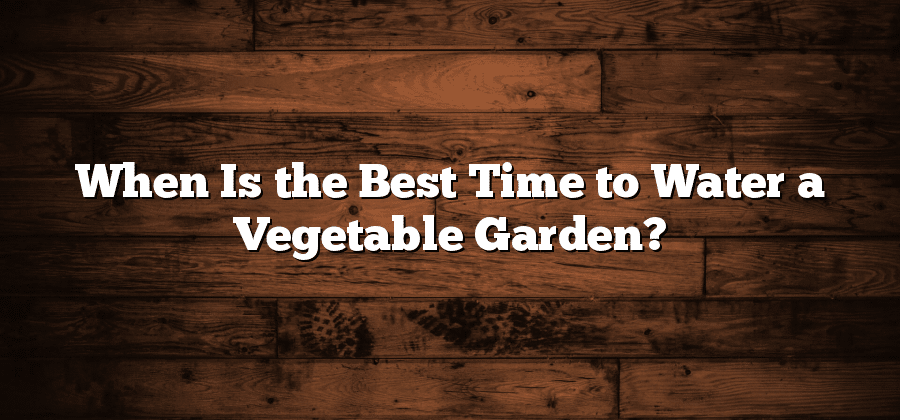Ideal Timing for Watering Your Vegetable Garden
One essential aspect of properly caring for your vegetable garden is ensuring that you water it at the ideal time. Timing is crucial when it comes to watering, as it directly influences the health and productivity of your plants. Watering at the right time allows the plants to absorb the necessary moisture, while also minimizing the risk of problems such as overwatering or underwatering.
The best time to water your vegetable garden is in the early morning or late evening. During these periods, the temperature is cooler, which means less evaporation and more efficient absorption by the plants. Watering in the morning also ensures that the leaves have ample time to dry before nightfall, reducing the risks of disease and pest infestation. By following these guidelines, you can maximize the effectiveness of your watering efforts and provide your vegetable plants with the hydration they need for optimal growth.
Importance of Proper Watering Techniques
Maintaining proper watering techniques is crucial for the success of your vegetable garden. Water is an essential element for plant growth, as it facilitates nutrient absorption and photosynthesis. Without sufficient water, your plants may struggle to produce healthy, vigorous crops. Conversely, overwatering can lead to root rot and other diseases that can harm your plants. Therefore, it is imperative to understand the importance of proper watering techniques to ensure optimal growth and yield from your vegetable garden.
One key aspect of proper watering techniques is to water deeply and infrequently. Shallow watering only moistens the top layer of soil, which can promote shallow root growth and leave plants vulnerable to drought. Instead, aim to provide a deep soak that reaches the plant’s root zone, promoting deep root growth and overall plant resilience. However, it is crucial to balance this technique with the specific water requirements of different vegetables, as some plants may have shallower root systems and require more frequent watering. Understanding the water needs of each vegetable variety in your garden will help you establish an effective watering routine that promotes healthy growth and maximizes water efficiency.
• Water is essential for plant growth as it facilitates nutrient absorption and photosynthesis
• Insufficient water can lead to unhealthy plants and low crop yield
• Overwatering can cause root rot and other diseases that harm plants
• Proper watering techniques ensure optimal growth and yield from your vegetable garden
• Water deeply and infrequently to promote deep root growth and overall plant resilience
• Shallow watering promotes shallow root growth, leaving plants vulnerable to drought
• Balance watering technique with specific water requirements of different vegetables
Understanding the Water Needs of Different Vegetables
Tomatoes, cucumbers, and peppers are some of the popular vegetable plants that require consistent watering. These plants thrive in moist soil and will wilt if they do not receive enough water. On the other hand, root vegetables like carrots and potatoes are more tolerant of dry conditions and require less frequent watering. Understanding the specific water needs of different vegetables is crucial for maintaining their health and maximizing their productivity.
Leafy greens such as lettuce and spinach have shallow root systems and therefore need more frequent watering. These plants should be watered every 2-3 days to ensure that the soil remains evenly moist. In contrast, vegetables like beans and peas have deeper roots, allowing them to access water from lower in the soil. They still require regular watering, but less frequently than leafy greens. By tailoring your watering schedule to meet the specific needs of each vegetable in your garden, you can provide them with the optimal growing conditions and promote their overall health and yield.
Signs of Overwatering Your Vegetable Garden
One of the common mistakes that gardeners make is overwatering their vegetable garden. While water is essential for the growth and health of plants, excessive watering can actually be detrimental. One of the signs of overwatering your vegetable garden is the presence of waterlogged soil. If you notice that the soil feels excessively wet and stays saturated for prolonged periods, it is a clear indication that you are using too much water. This can lead to the suffocation of the plant roots, making them susceptible to diseases and rot.
Another sign of overwatering is the appearance of yellowing leaves. When plants receive more water than they need, it can disrupt their nutrient uptake and cause the leaves to turn yellow. Additionally, overwatering can also promote the growth of fungi and other pathogens, leading to the development of diseases like root rot. Keep an eye out for any wilting or yellowing leaves, as it may be a result of overwatering.
Signs of Underwatering Your Vegetable Garden
Vegetable gardens require proper irrigation in order to thrive and produce a bountiful harvest. However, sometimes gardeners may unknowingly underwater their plants, causing stress and hindering their growth. There are several signs to look out for that indicate your vegetable garden is not receiving enough water.
One of the most obvious signs of underwatering is wilting. When plants do not receive an adequate water supply, their leaves and stems may become limp and droopy. This is a result of the plant’s attempt to conserve water by reducing the amount of surface area exposed to the sun. Additionally, the leaves may also appear yellow or brown, indicating a lack of moisture reaching the plant’s cells. Another common sign of underwatering is stunted growth. If the plants in your garden are not receiving enough water, their growth may be slow and they may fail to reach their full potential. This can be particularly noticeable in the size of the vegetables produced. Keep an eye out for unusually small or misshapen fruits and vegetables as these can be signs of inadequate irrigation.






